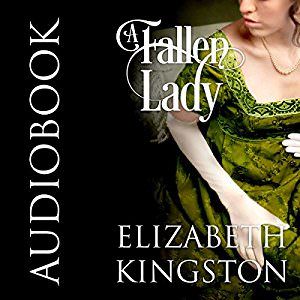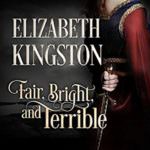 Narrated by Nicholas Boulton
Narrated by Nicholas Boulton
In A Fallen Lady, Elizabeth Kingston and Nicholas Boulton leave the political intrigue and the rolling hills and valleys of medieval Wales behind them and head East (and a few centuries into the future) to end up in Regency era Herefordshire for this story of a young woman who refused to endure the censure of society and her family and left both of them behind her in order to carve out a new life for herself.
Six years earlier and aged just seventeen, Lady Helen Dehaven jilted her fiancé without explanation, even though they had previously been found in a compromising position. In refusing to marry him, Helen risks irretrievable damage to her reputation and being shunned by society, but when she attempts to explain the situation to her brother, he dismisses her as hysterical and her explanation as wild and incomprehensible. Young as she is, Helen is stunned by his lack of faith in her, and leaves home, settling in the small village of Bartle-on-the Glen in Herefordshire where she owns a small dower house. She makes a life for herself there, becoming popular with the villagers who are all very protective of her. It’s not easy – Helen was born into luxury and has had to learn to keep house for herself, and she lives practically from hand to mouth – but she is independent and mostly content, especially in her friendship with Marie Anne de Vauteuil, the former mistress of a nobleman and another “fallen” woman who lives in the village.
Into this rustic idyll one day rides Stephen Hampton the Earl of Summerdale, whose country estate is not far from Bartle, and who has been asked by Helen’s brother, Alex, the Earl of Whitemarsh, to ascertain the state of Helen’s well-being and to see if there is any possibility of a reconciliation between them. Stephen is young, handsome, wealthy and widely regarded as one of the most honourable, upstanding gentlemen in society. He knows everyone and everything; his reputation for discretion and for giving good advice is second-to-none and he has become something of society’s keeper of secrets. But he is finding himself increasingly uncomfortable in that role and tired of the tawdry secrets and intrigues into which he is often drawn, so when his friend Whitemarsh asks him to check on his sister, and try to discover the truth of what happened six years ago, Stephen is only too glad to have the excuse to leave London and settle in the country for a few months.
Helen is suspicious of Stephen, and makes it clear that while she would love to see her brother and his new wife – who wrote to Helen upon the occasion of their marriage – Alex’s refusal to accept or even listen to her explanation for her actions all those years ago hurt her deeply, and that she cannot just forgive and forget. At first, Stephen is inclined to believe Helen to be what society says she is – a fallen woman – but there is something about her that draws him to her, an inner strength and determination he cannot help but admire as well as a certain vulnerability she keeps very well hidden. Over the next days and weeks, he seeks her out frequently, enjoying her company and appreciating her intelligence and quick wit. She remains steadfastly tight-lipped about the past, but Stephen finds himself caring less and less about her brother’s request and more and more interested in her for her own sake; he realises society has judged her harshly – and worse, that things could have been smoothed over had Alex stood by her instead of rejecting her.
Helen finds herself gradually shedding her suspicions about Stephen and allows herself to take pleasure in his company, too, although she tries to ignore the stirrings of attraction he evokes in her. She hasn’t felt anything like that for a man since she was so foolishly infatuated with her erstwhile fiancé and tells herself that her life is different now and that she has other priorities. Yet she is as drawn to Stephen as he is to her and gradually, she lowers some of her defences and allows him to get closer to her than she has allowed anyone apart from Marie-Anne, and to learn something of the truth.
The romance between Helen and Stephen moves at a leisurely pace and is imbued with tenderness, longing and simmering sexual tension. It’s clear to the listener fairly early on what must have happened to Helen, and her refusal to tell the truth can be a little frustrating. But when taken in context of the time at which the book is set, and her unwillingness to allow that event to define her, it becomes more understandable, even though her stubbornness looks set to threaten the happiness she is beginning to find with Stephen.
There’s something of a role reversal going on, as Helen is the one with the dark past while Stephen is warm and open-hearted, seemingly without a care in the world – although it emerges that this isn’t quite the case and that he has his crosses to bear, too. He’s a lovely hero, though – charming, kind and protective, it’s clear he’d do anything for Helen, even sacrifice his own good name and reputation if necessary. Helen is harder to like, however; she has grown so used to guarding her emotions that she persists in holding herself back, even in moments of intimacy, whereas Stephen willingly gives her himself – heart, body and soul – and it’s almost heartbreaking to listen to his bewilderment at why the woman he loves won’t – or can’t – share herself with him completely.
I really enjoyed the book when I read it a couple of years back; it’s a compelling and very well-written story and the complex characterisations and emotions just leapt off the page. As Ms. Kingston proved in Fair, Bright and Terrible, she has a knack for writing prickly heroines – not that Helen is much like Eluned! – and making their prickliness understandable even if it’s not always easy to like them as a result. Adding Nicholas Boulton into the mix, however, brings an extra dimension to Helen, because he is able to convey so much of the emotional conflict that is going on beneath her words and expressions. Maybe that seems an obvious thing to say – having someone actually speaking the dialogue is of course different to reading it for oneself – but in much the same way as he makes Maddy’s actions that much more understandable in Laura Kinsale’s Flowers from the Storm (I’ve chosen her because she’s a heroine whom many find hard to like), so he does the same with Helen; she’s strong and stubborn, but the woman who still hurts beneath the thick layers of self-protection is there – buried and long-suppressed, but she’s there. Stephen is more of an open-book; charming, kind and mostly optimistic, his good-humour is apparent in his voice and demeanour, but Mr. Boulton’s portrayal is also full of subtle nuances that bring out the complexities in his character. He’s an easy going man, but is also one possessed of great natural authority and all the different facets to him are expertly communicated to the listener.
I have yet to fault any of the technical aspects of any of Nicholas Boulton’s performances, and I’m not about to do so here, because his pacing and character differentiation are excellent and his vocal characterisations are superb. Helen’s friend, Marie-Anne is deliciously Gallic, the local villagers and farmers are suitably rustic, and Stephen’s mother and sister sound – appropriately – horribly snooty and snootily horrible!
Historical Romance is a popular sub-genre and while there are a lot of good books out there (and a lot of dross, too!) there are also a small number of gems published each year which stick in my memory – and A Fallen Lady is one of them. Strong writing, rich characterisation and a tender and (sometimes) angsty central relationship combine to make this an engrossing listen; and with Nicholas Boulton proving, once again, exactly why his name on the front of an audiobook makes us jump for joy, it’s highly recommended.
Caz
Buy A Fallen Lady by Elizabeth Kingston on Amazon



